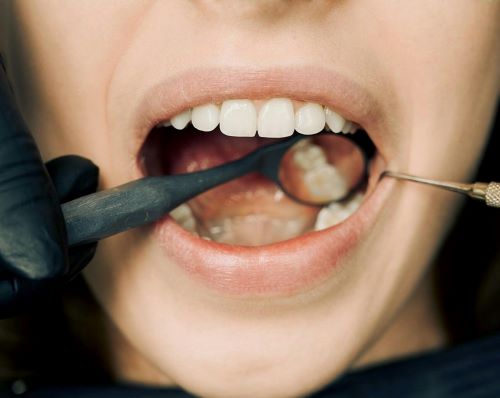Many complaints such as weight gain, tiredness, morning sickness, and mood disturbances occur in pregnancy due to hormonal imbalance during the time of pregnancy.
Out of all these problems, bad breath, or halitosis, is an offensive odor or unpleasant smell from mouth cavities, such as the sinuses, nose, and pharynx.

Causes of pregnancy bad breath
Hormonal disturbances
Hormonal changes are one of the main causes of pregnancy bad breath.
Progesterone and estrogen levels change in the body which potentiate the response of the gums to plaque causing gingivitis or gums inflammation.
Accumulation of plaque leads to an offensive odor of breath because it is majorly composed of bacteria.
Morning sickness
Morning sickness represents one of the most common problems in pregnant women.
It causes nausea and vomiting which ultimately exposes the mouth to pungent stomach acids and undigested materials leading to bad breath.
Dehydration
Pregnancy causes dehydration, and lack of hydration causes a stinky mouth.
Dry mouth
Saliva helps with activities like swallowing and chewing.
It also cleanses the mouth from food crumbs and bacteria.
Pregnant women experience dry mouth or reduced salivary flow.
As a result, bacteria accumulate producing bad breath.
Sinus issues
During pregnancy, sinus infections are common.
Mucus formed helps bacteria to multiply, causing an increase in bad breath.
Gingivitis
During pregnancy, gums's sensitivity to plaque increases which leads to gingivitis
The bacteria then release volatile sulfur compounds resulting in bad breath.
Lifestyle changes
Pregnancy causes hunger pangs frequent snacking and eating sugary or junk food.
A strong fragrance like garlic, onions, and coffee might cause a bad mouth odor.
De-mineralization
Pregnant women offer and provide their growing baby with all the nutrients and materials it requires.
When calcium supplements are insufficient, the baby is struggling to obtain all the necessary calcium, and this will draw minerals from the mother’s body.
This mineral deficiency can lead to weakened teeth and as a result an increase in the chances of tooth decay and thus bad breath.
Signs of pregnancy bad breath
In many cases, pregnancy bad breath might not be realized unless others notice but some signs are present :
1. Dry mouth or reduced salivary flow.
2. Coated tongue.
3. Upsetting metallic and bitter taste in the mouth.
4. Red, swollen, and bleeding gums.

How deal with pregnancy bad breath?
Complete treatment of pregnancy bad breath can be challenging and does not always need medical interventions.
However, there are some tips to minimize it:
Maintain proper oral hygiene
Because of increased snacking and hormonal changes, pregnant women are more susceptible to tooth decay resulting in gingivitis.
These are some pieces of advice to improve oral care while pregnant:
Brushing teeth for 2-3 minutes twice a day, especially between meals.
Daily floss of teeth to avoid food debris stuck between teeth.
Cleaning the tongue as it shelters bacteria that might cause halitosis
Use over-the-counter or alcohol-free mouthwash to rinse the mouth after a meal.
Food with a strong smell should be avoided.
Eating food that is rich in fiber.
Maintain regular dental check-ups
Due to the increased incidence of oral health issues and tooth decay in pregnancy.
Regular check-ups are recommended to avoid any other complications that may result during pregnancy.
Drink more water
Keep the whole body hydrated by drinking plenty of water.
Because water is excessively lost through sweat and urine.
Drinking water frequently throughout the day helps moisten the mouth.
Wash it from bacteria, and get rid of the smelly mucus that causes bad breath.
Avoid late-night snacking
Snacking by eating sugars, sweeter foods, or energy boosters would encourage pregnancy bad breath, also caffeine dries the mouth.
5. Proper calcium supplementation
A sufficient calcium intake diet especially in the latter stages of pregnancy is necessary.
Recalcifying toothpaste may be useful for ensuring that teeth have the proper protection.
Foods that diminish pregnancy bad breath
In addition to proper oral hygiene, diet also has a huge impact.
Apples
Due to their natural cleansing properties, they help remove food particles and plaque from teeth.
Water
Drinking plenty of fluids, specifically water, especially between and after a meal.
Helps wash away food particles, and keeps the mouth feeling fresh.
Yogurt
It contains probiotics that fight bacteria and diminish the accumulation of hydrogen sulfide which is an odor-causing compound.
Citrus fruits
Vitamin C is involved in the destruction of pathogenic bacteria in the mouth.
Eating plenty of vitamin C-rich foods can help prevent pregnancy bad breath and gum diseases.
Herb and spices
Rosemary, spearmint, cardamom, parsley, basil, or clove can freshen breath quickly.
Because they contain polyphenols, which destroy and help break down sulfur compounds present in foods.
Green tea
Green tea contains catechins, powerful antioxidants which can destroy odor-causing microorganisms.
Milk
It helps reduce the oral concentration of sulfur-containing compounds.
Nuts
Almonds, walnuts, and pistachios are rich in fiber which helps remove the bacteria that cause bad breath.
Sugarless gum
Stimulats the salivary glands and can help rinse away bacteria and plaque.
Summary
Pregnancy bad breath is an offensive odor or unpleasant smell caused by many reasons, especially hormonal disturbance.
It can not be treated totally but it can be minimized and prevented by many tips including oral hygiene and lifestyle modification.


You must be logged in to post a comment.